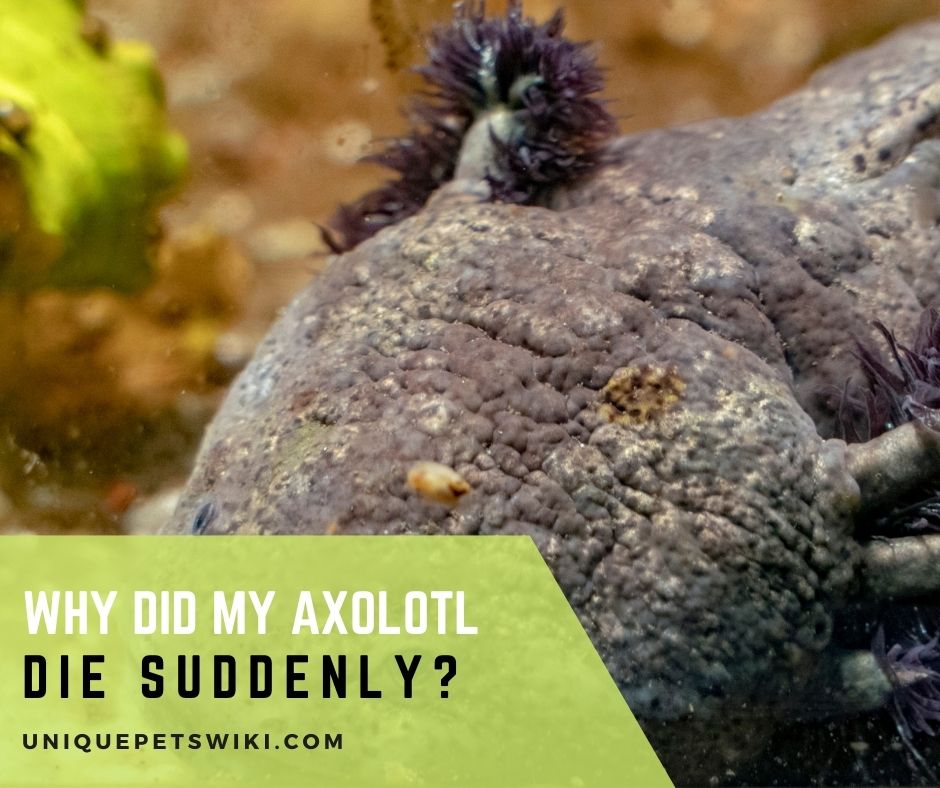As a new axolotl owner, it can be quite challenging to care for axolotl because they require special care.
Axolotl has a relatively long lifespan and can live for about 15 years under optimal care. However, axolotls can die suddenly, and even be harder if you don’t know what happened.
Axolotls can die at an earlier age due to several reasons. This can be because of old age, disease, poor water quality, etc.
As a responsible axolotl owner, you should try to know why your axolotl dies suddenly to help prevent it from happening in the future.
We have helped highlight some of why your axolotl died suddenly and things you can do when your axolotl dies.
Contents
What Does A Dead Axolotl Look Like?
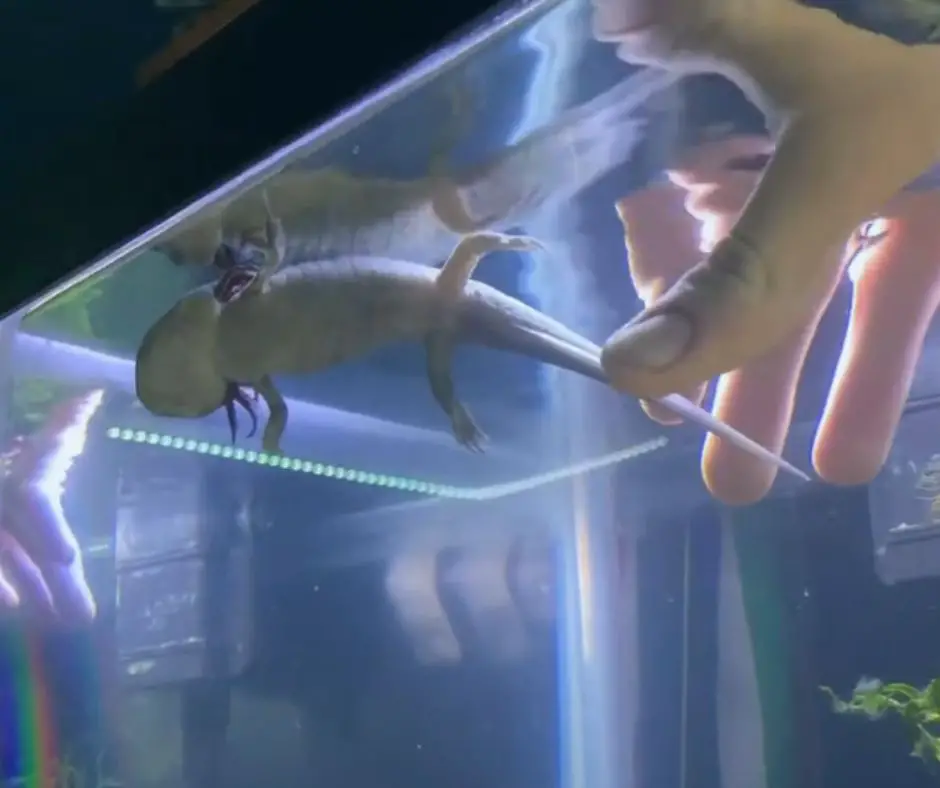
A dead axolotl usually lay on its side or back with its limbs in the air. A dead axolotl will also be floating uncontrollably in their aquarium and smell. You can also see a dead axolotl in a curled-up position.
However, axolotls can also play dead while floating, allowing the water current to carry them.
The only difference is that an axolotl playing dead will only stay in that position for about 10-40 seconds before it starts moving.
The best way to determine if an axolotl is dead is to wait for about 60 seconds to see if it moves again. You can also try to scare the axolotl since it will go back to the tank bottom if it is just playing dead.
Note: floating in axolotls is abnormal. You should observe them if you notice that your axolotls are floating for a long time.
It could be a sign that your axolotl is suffering from health problems, or the water condition is not ideal for them.
Also read: Why Is My Axolotl Floating?
7 Causes Explain Why Did Your Axolotl Die Suddenly
As stated before, axolotls can die because of several reasons. They can die if you keep them in an aquarium with poor water quality or even die of old age.
Some of the signs you can be on the lookout for to determine that your axolotl will die suddenly:
- It has a painful look
- Your axolotl open mouth repeatedly
- It has internal bleeding
- Your axolotl is shedding a slimy coat
- It has white salty spots
- Your axolotl looks skinny
- Lethargy
- Your axolotl stops eating
Some of the common reasons for an axolotl to die suddenly are stated below.
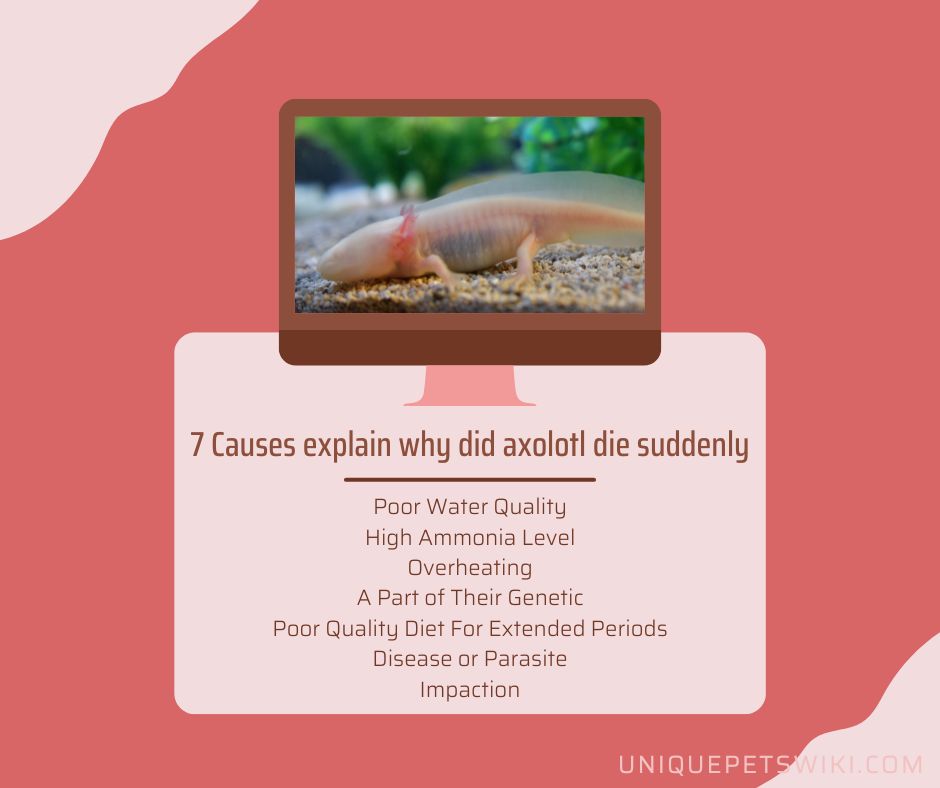
Poor Water Quality
One of the common reasons for an axolotl to die suddenly is poor water quality. This usually happens because of the owner’s carelessness.
Many axolotl owners opt against using a filter for their axolotl aquarium, which is very important.
Without a filter, water cycling in their aquarium will not be possible, leading to the buildup of several chemicals and toxins like ammonia over time. Some of the other things that can cause poor water quality are:
- The water used in your axolotl aquarium is dechlorinated incorrectly.
- The tap water used for your axolotl aquarium is contaminated
- You don’t change the aquarium water regularly.
- Poor water quality can lead to stress for your axolotl and become fatal if not treated.
You can easily prevent the buildup of harmful chemicals and toxins by using a filter to keep the water quality in the tank at a high level.
Furthermore, you should change your axolotl water weekly and more frequently if the water quality level is very poor.
Also read: Full Requirements & Water Conditions for Axolotl in Captivity
API Water Test Kit
- Contains one (1) API FRESHWATER MASTER TEST KIT 800-Test Freshwater Aquarium Water Master Test Kit, including 7 bottles of testing solutions, 1 color card and 4 glass tubes with cap
- Helps monitor water quality and prevent invisible water problems that can be harmful to fish and cause fish loss
- Accurately monitors 5 most vital water parameters levels in freshwater aquariums: pH, high range pH, ammonia, nitrite, nitrate
- Designed for use in freshwater aquariums only
- Use for weekly monitoring and when water or fish problems appear
Last update on 2022-12-30 / Affiliate links / Images from Amazon Product Advertising API
High Ammonia Level
The buildup of ammonia in your axolotl tank can also cause sudden death to your axolotl. Generally, an axolotl can function abnormally if its water contains a high ammonia level.
Ammonia can get into their internal organs and affect your axolotl’s skin.
You can determine that an axolotl dies from ammonia poisoning if the mouth is open after death.
Axolotl cannot tolerate ammonia buildup in their tank, and you should ensure the ammonia level is at 0ppm.
This means you will need to regularly check the ammonia level and change axolotl water. You should also ensure the water temperature in their aquarium is always stable.
Overheating
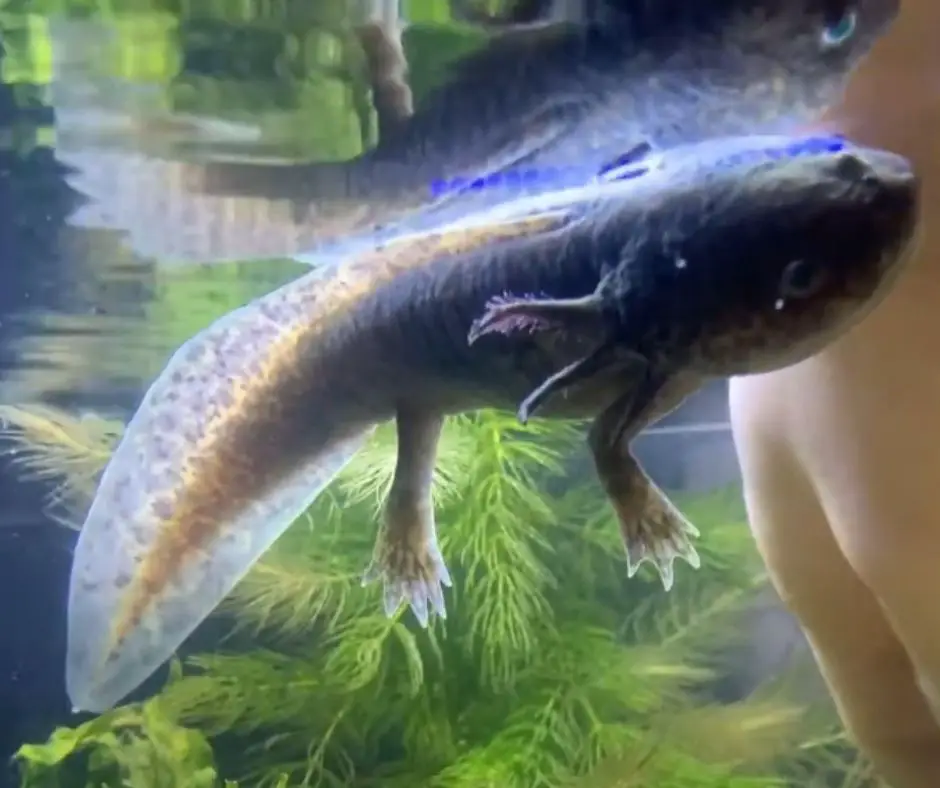
Keeping your axolotl in the wrong water temperature is another reason your axolotl dies suddenly. Axolotls require cold water temperature between 16-18C or 60-64F to stay healthy and active.
However, keeping them in a tank with too high or too low a temperature for an extended period can be fatal.
This is why you should always regularly monitor the water temperature in your axolotl’s enclosure.
Also read: Axolotl Temperature (Tips to Maintain an Ideal Temperature)
A Part of Their Genetic
There are situations where there is nothing you can do about the death of your axolotl. For instance, if your axolotl is more prone to health problems naturally, there is nothing you can do about it.
The best thing to do is search for an axolotl less prone to diseases before buying it.
Another thing is that an axolotl can die due to old age. The average lifespan of an axolotl is between 10-15 years. So, this means it is very easy for an axolotl to die suddenly if it has lived for over nine years.
Poor Quality Diet For Extended Periods
Axolotls can die suddenly if you feed them with a poor quality diet for an extended period. This is because your axolotl will not get the required nutrients needed for their growth.
The most common ways axolotl owners feed their axolotl with a poor quality diet are:
- Overfeeding your axolotl with a poor quality diet.
- Underfeeding your axolotl with a quality diet.
Either way, your axolotl will not get the required nutrients.
Furthermore, feeding axolotl with live fish carrying different parasites for an extended period can also lead to health problems.
This is why you need to ensure you feed them with quality food which should be in adequate quantity.
Also read: What Can Axolotl Eat?
Tetra BloodWorms, Freeze-Dried Food for Freshwater and Saltwater Fish
- AQUARIUM DIET SUPPLEMENT: Freeze-dried bloodworms are a nutritious supplement to boost energy and conditioning in your aquarium fish.
- FOR FRESHWATER & SALTWATER FISH: Perfect for bettas and ideal for small- to medium-sized tropical and marine fish.
- SPECIALLY PROCESSED: Minimizes any undesirable organisms found in live bloodworms.
- CHILD-SAFETY LID: Tetra BloodWorms should be kept out of reach of children.
- USAGE: Feed 2 to 3 times a week in addition to staple diet, only as much as your fish can consume within a few minutes.
Last update on 2022-12-29 / Affiliate links / Images from Amazon Product Advertising API
Disease or Parasite
Sometimes, axolotls can die suddenly if they suffer from a disease or parasite.
Axolotls can experience parasite problems if you feed them with live fish infested with parasites or keep them in a tank with bad water quality.
A parasite can then lead to the death of your axolotl if not detected at an early stage.
The best way to prevent parasites in axolotl is to ensure you only feed them with quality foods from a reliable provider. You should also try to keep the water in their tank as clean as possible.
Impaction
Impaction can also cause death in axolotl since it is hard to treat axolotl with impaction.
Axolotl can become impacted if it feeds on something it can’t digest or consumes a piece of gravel that gets stuck in its gut. This prevents it from eating or defecating.
Your axolotl can then become swollen, leading to death. You can treat impaction in axolotl by cooling their aquarium.
This will help the axolotl excrete or regurgitate what is stuck in their stomach. You may even need to consult with a vet if your axolotl still has a problem passing out the mass for surgery.
Also read: 8 Axolotl Dying Signs (and Some Treatments)
Can Axolotls Come Back To Life?
Axolotls are considered the only vertebrates that can regenerate their body parts. Many axolotl owners believe they are immortal and can come back to life after dying.
However, axolotls cannot come back to life after death because of their regenerating ability. They can only regenerate their body parts when they are alive.
What Do You Do With A Dead Axolotl?
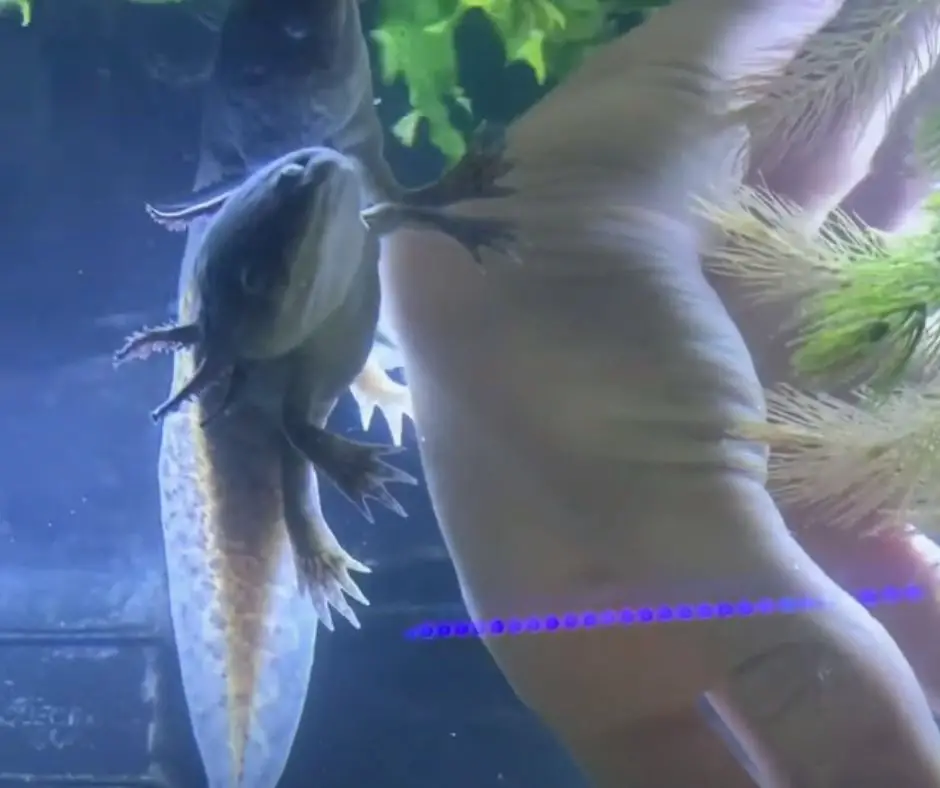
When you see a dead axolotl, the first thing to do is to remove the axolotl from the tank.
You should then replace the water tank or remove all the remaining axolotls in the tank to a temporary aquarium until the water quality is normal.
Dead axolotls can make the water dirty very fast and stress the other tank mates.
Furthermore, the other fish in the aquarium can also become infected if you leave them in the same tank.
You can then wrap up the dead axolotl and put it in the trash or bury it in your yard or a potted plant.
But we recommend burying them, which can both protect the environment and also be a place of memories.
Wrapping Up
It is a big responsibility to own an axolotl as they need special care to keep them healthy and happy.
The good thing is that they have a long lifespan and can live for about 15 years under optimal care.
The sad thing is that your axolotl can die of old age or several other reasons like poor water quality, stress, health problems, etc.
We would like to hear from you in the comment section if you have experienced the death of your axolotl and a word of advice from you.
